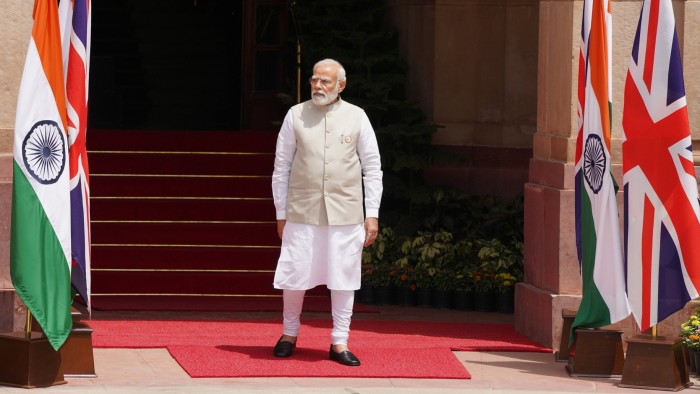Unlock the Editor’s Digest for free
Roula Khalaf, Editor of the FT, selects her favourite stories in this weekly newsletter.
Britain and India will relaunch talks on a long-awaited trade deal, kick-starting negotiations that timed out due to elections in both countries last year.
UK business secretary Jonathan Reynolds will meet Indian commerce minister Piyush Goyal in New Delhi on Monday for two days of discussions.
British investment minister Poppy Gustafsson is expected to address investors in the business centres of Mumbai and Bengaluru to pitch the UK as the “best and most connected place” for Indian capital.
Advanced manufacturing, clean energy, financial services, and professional and business services are among the sectors in which UK officials believe a trade agreement could bolster opportunities for British businesses and consumers in the world’s most populous country.
Sir Keir Starmer’s government pinpointed an agreement with India as one of its priorities for fresh trade deals — with a six-strong group of Gulf countries, Israel, South Korea, Switzerland and Turkey also on the list — when Labour came to power last year.
The Indian government has also voiced upbeat sentiments about the prospect, but last summer Goyal warned Britain not to place “a gun [to] our head” by imposing a deadline on the renewed talks.
Protracted talks on a free-trade pact began under the Conservative administration in 2022, but were put on hold last year as both countries held general elections.

The two sides have reached an agreement on most chapters of a future deal, according to UK and Indian officials, but the negotiations have stuck on a few points, including visas for short-term deployments of Indian workers to the UK and New Delhi’s push for social security payouts from the UK for Indians who have worked there.
Before the talks were put on pause last year, Narendra Modi’s government was also holding out for an asymmetrical tariff framework, arguing that while the countries’ economies are at present about the same size, India will present Britain with a bigger future opportunity because of its higher GDP growth rates.
In advance of the negotiations recommencing, Reynolds said it was a “no brainer” to seek a trade deal, with India on track to become the third-biggest global economy by 2028.
“Growth will be the guiding principle in our trade negotiations with India and I’m excited about the opportunities on offer in this vibrant market,” he said.
India’s growth forecasts are the highest in the G20 over the next five years and its burgeoning middle class, set to swell to 95mn people by 2035, is seen by the British government as a key export market for UK businesses.
UK officials point out that foreign direct investment from India increased 28 per cent year on year by the end of 2023, the latest point for which statistics are available.
The trade relationship is worth £41bn a year and supports more than 600,000 jobs across both countries, according to the UK government.
However, a deal with India has so far proved more elusive than senior proponents of Brexit had hoped. Former Tory prime minister Boris Johnson had suggested a trade deal with India would be one of the key prizes from quitting the EU, and had vowed to secure one “by Diwali” in October 2022.
Richard Heald, chair of the UK India Business Council, welcomed Reynolds’ delegation as proof of the British government’s “commitment for a new ambitious and future-focused trade and investment relationship with India”.

















